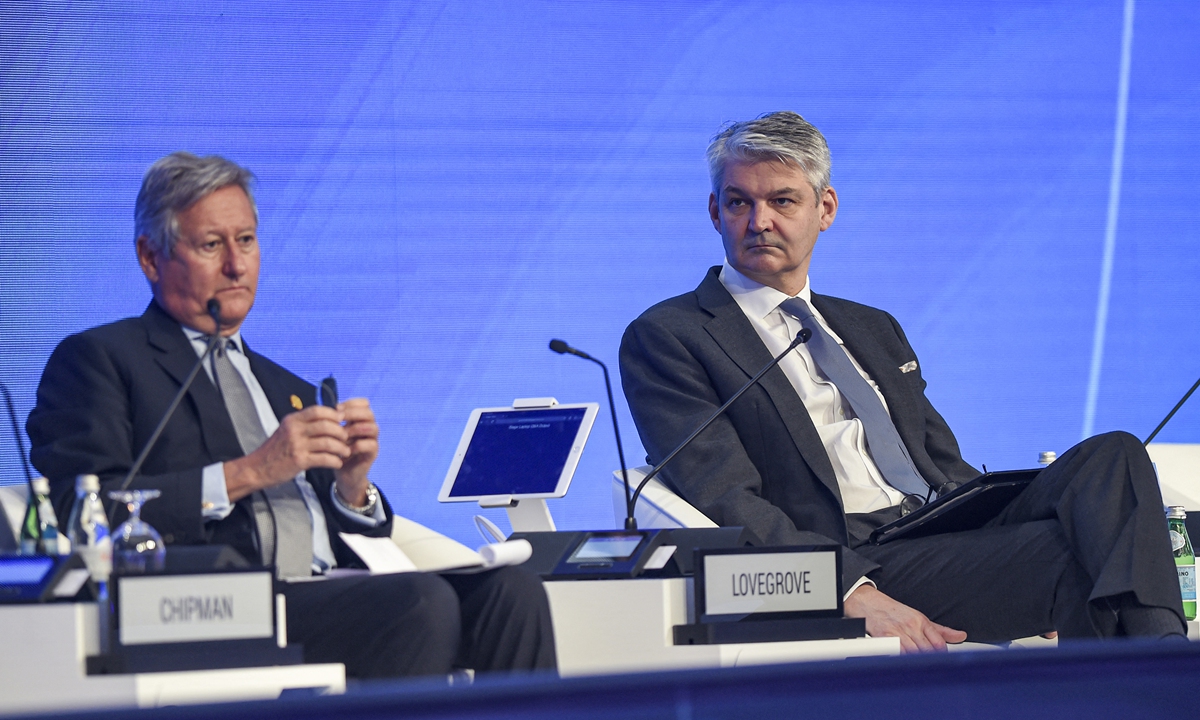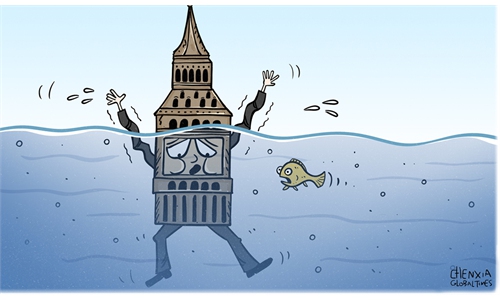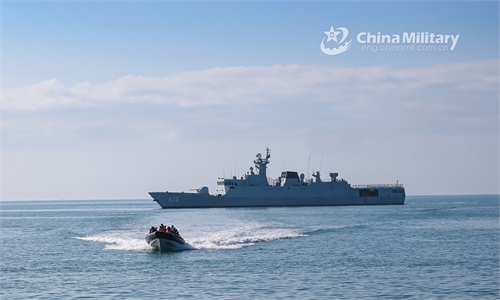
UK National Security Adviser Sir Stephen Lovegrove (right) attends the 17th IISS Manama Dialogue in the Bahraini capital Manama, on November 20, 2021. Photo: AFP
Is the prospect of a nuclear war overstated or underestimated under the current tensions among major powers? Some observers attempt to discuss the topic in a serious manner. Yet most of the time, an imaginary nuclear war is used as a tool of incompetent, unqualified Western politicians to make themselves look impressive or divert the attention of their own people from domestic challenges. Worse yet, they do not even know what they have been talking about. The UK's national security adviser is an example.During his speech at the Center for Strategic and International Studies in Washington on Wednesday, Sir Stephen Lovegrove pushed the idea that poor communication raises the risks of nuclear war with China or Russia. He said the UK has "clear concerns" that China is expanding and modernizing its nuclear arsenal, and that the world may no longer have the negotiation and dialogue developed during the Cold War which prevented nuclear war with the Soviet Union.
What negotiations and dialogues? Nowadays, in the eyes of Western countries like the US and the UK, a "proper communication" means that the Anglo-Saxon countries impose their own will on China and Russia, abiding by their unilaterally "international order." Meanwhile, Beijing and Moscow had better be obedient and yield to Western hegemony, Song Zhongping, a Chinese military expert and TV commentator, told the Global Times.
There has been communication between China, Russia and the West. Yet, mutual trust between the two sides keeps nose-diving. The root cause is not communication, but the aggressive and overbearing manner of the West, led by the US, toward China and Russia. It is ridiculous to hype the scenario in which the West, China and Russia may stumble into an uncontrolled conflict, even a nuclear war, while Western powers are continuously provoking, blatantly disregarding all the warning signs set by the other two.
Russia has articulated multiple times that NATO's eastward expansion threatened its core security interests. Unfortunately, NATO crossed the line set by Moscow and blamed Russia afterward. In terms of the Taiwan question, China is making clear its red line. But the US seems to want to keep testing the limits. If the West does not wish to slip into a conflict with other major powers, they should start with some self-examination.
Regarding the nuclear threat, it should be noted that the biggest peril to the international community is the US. The US has the largest nuclear arsenal in the world and to ensure its absolute security and military superiority, it has left several international treaties on arms control and non-proliferation, consistently pushed the deployment of anti-missile systems worldwide, sought to deploy land-based intermediate-range missiles in Europe and the Asia-Pacific, and formed the Cold War-like "cliques" such as AUKUS. How could China and Russia accept such hegemonic behavior?
When Lovegrove pretentiously warned against a nuclear war, he sounded like the UK is an innocent party. In June, Russia said it had summoned the British ambassador to voice a strong protest against "offensive" British statements, including alleged threats from Russia of using nuclear weapons. London apparently downplayed it. This might not be the first time for the UK to fan the flames of a conflict with nuclear weapons. Dmitry Kiselyov, a Russian TV host, asked in May, "Why threaten horizonless Russia with nuclear weapons when you sit on a small island?" The remark was made, according to reports, as a response to outgoing British Prime Minister Boris Johnson who allegedly threatened Moscow with a nuclear strike.
The British politicians, like Johnson and Lovegrove, seem to be still living in the nostalgic past when the UK was almighty. They seem to have no idea what has been going on in the world. Even US Defense Secretary Lloyd Austin is careful in wordings when it comes to "nuclear warfare."
Unfortunately, there seems to be too many amateur, unqualified high-level officials in Western countries nowadays. They are reluctant to confront their own challenges at home while passionately accusing China and Russia, without any idea of how to have an adult communication with other major powers, as if blaming China and Russia is the panacea. They are the biggest challenge in the relations between China, Russia and the West, Shen Yi, a professor at Fudan University, told the Global Times.
Perhaps it is time for those politicians to go back to school and the first lesson they should learn is that "communication among major powers is an art of mutual compromise sometimes, as the days when the West could order the world have long gone," Song said.


